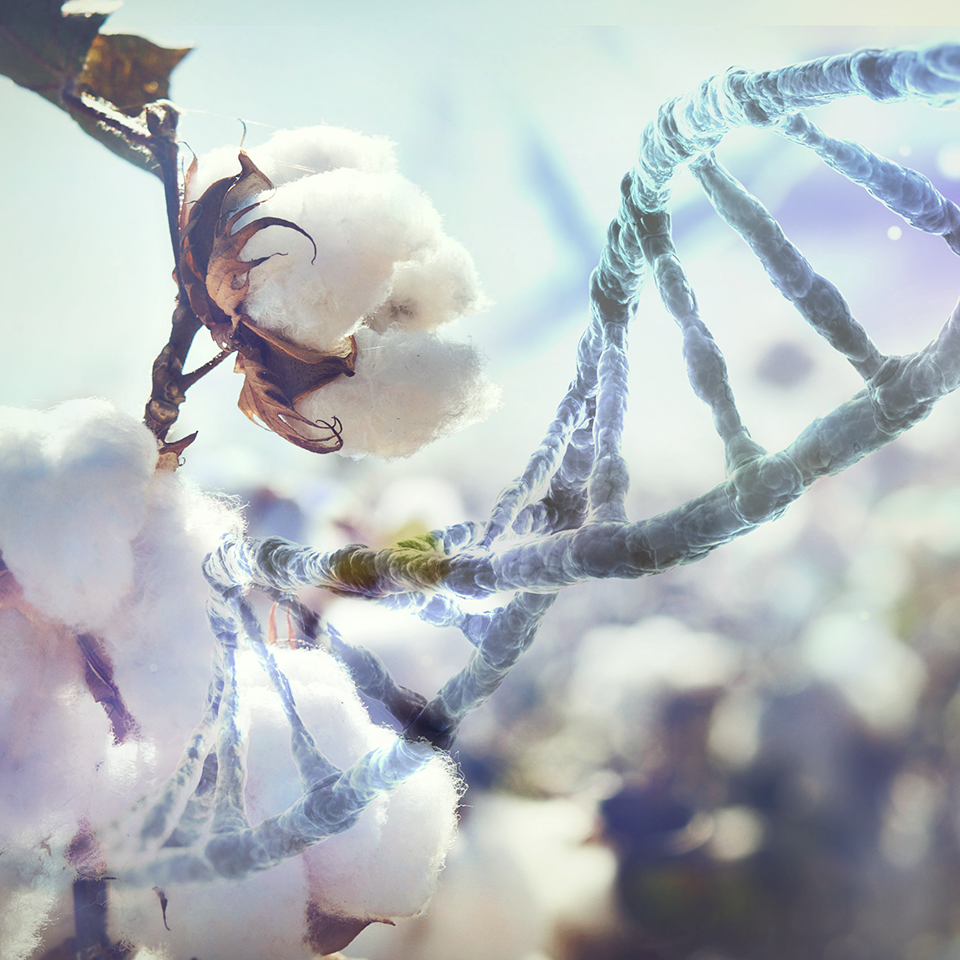
Initial Findings of Egyptian Cotton Sampling Presented to Textile Executives, Advances Use of Genomics for End-to-End Supply Chain Traceability
Company Files Provisional Patent Application with U.S. Patent and Trademark Office for Giza 94 Cotton Biomarker
STONY BROOK, N.Y. – December 6, 2021 – Applied DNA Sciences, Inc. (NASDAQ: APDN) (Applied DNA or the “Company”), a leader in Polymerase Chain Reaction (PCR)-based DNA manufacturing and nucleic acid-based technologies, announced today a development in its cotton genomics program (the “Program”) that the Company believes can bring forensic proof of cotton authenticity and provenance specifically related to regional cotton varietals to give brands and relevant regulatory authorities access to fiber origin data regardless of location of manufacture. The Company recently presented initial data describing a methodology and findings for the successful determination of Egyptian cotton fiber, yarn and fabric origin using the combination of cotton genomics and isotopic analysis (IA) at an American Apparel and Footwear Association event. Applied DNA intends to publish its methodology and data upon completion of its manuscript.
The Program, an ongoing applied genomics strategy to identify genomic markers that are associated with cotton grown within specific geographies, has identified a biomarker specific to Giza 94, the largest planted Egyptian cotton varietal1 used in the production of premium cotton textiles. This biomarker was confirmed to be specific to Giza 94 grown in Egypt by validation with stable isotope analysis through a collaboration between the Company and Isotech Laboratories, a division of Stratum Reservoir. The data showed the Giza 94 biomarker was present in all samples bearing an IA signature from Egypt. The biomarker was not present in samples confirmed to not be of Egyptian origin by IA.
Given these findings, the Company believes that it has proven for the first time that the geographic origin of cotton can be definitively ascertained via genotyping, a process of determining minute differences in the DNA of living matter. The Company has filed a provisional patent application on its newly discovered biomarker with the U.S. Patent and Trademark Office and intends to develop the biomarker into a rapid and cost-effective geoTyping™ assay that can be performed by various supply chain stakeholders and/or any molecular diagnostics lab.
Dr. James A. Hayward, chairman and CEO of Applied DNA, stated, “With textile brands sourcing finished product from factories globally, the provenance of cotton is often opaque to brands, regulatory bodies, and consumers alike. The ability to determine Egyptian Giza 94 cotton origin genomically via DNA-based geoTyping is a game-changer for an industry still recovering from the multi-hundred-million-dollar fallout in 20162 of mislabeled cotton sheeting sold by leading U.S. retailers. The industry is seeking to find a fast, accurate, and immutable means of establishing cotton origin to address concerns of cotton authenticity and provenance. Through geoTyping, we are working to bring the same level of fidelity to cotton from the U.S., India, Australia, and China.”
References:
- https://www.fibre2fashion.com/industry-article/8410/booming-egyptian-cotton-trade#utm_source=f2f&utm_medium=content&utm_campaign=Interlinking
- https://www.wsj.com/articles/wal-mart-in-2008-looked-into-authenticity-of-cotton-sheets-supplied-by-welspun-india-1472160712
About Applied DNA Sciences
Applied DNA is commercializing LinearDNA™, its proprietary, large-scale polymerase chain reaction (“PCR”)-based manufacturing platform that allows for the large-scale production of specific DNA sequences.
The LinearDNA platform has utility in the nucleic acid-based in vitro diagnostics and preclinical nucleic acid-based drug development and manufacturing market. The platform is used to manufacture DNA for customers as components of in vitro diagnostic tests and for preclinical nucleic acid-based drug development in the fields of adoptive cell therapies (CAR T and TCR therapies), DNA vaccines (anti-viral and cancer), RNA therapies, clustered regularly interspaced short palindromic repeats (CRISPR) based therapies, and gene therapies.
The LinearDNA platform also has non-biologic applications, such as supply chain security, anti-counterfeiting and anti-theft technology. Key end-markets include textiles, pharmaceuticals and nutraceuticals, and cannabis, among others.
Leveraging its deep expertise in nucleic acid-based technologies, the Company has also established safeCircle™, a high-throughput turnkey solution for population-scale COVID-19 testing. safeCircle is designed to look for infection within defined populations or communities utilizing high throughput testing methodologies that increase testing efficiencies and provide for rapid turn-around-times. The Company has also submitted a request for an EUA-authorization for its Linea™ SARS-CoV-2 Mutation Panel, an assay-based panel for the detection of certain SARS-CoV-2 genetic mutations.
Visit adnas.com for more information. Follow us on Twitter and LinkedIn. Join our mailing list.
The Company’s common stock is listed on NASDAQ under ticker symbol ‘APDN,’ and its publicly traded warrants are listed on OTC under ticker symbol ‘APPDW.’
Applied DNA is a member of the Russell Microcap® Index.
Forward-Looking Statements
The statements made by Applied DNA in this press release may be “forward-looking” in nature within the meaning of Section 27A of the Securities Act of 1933, Section 21E of the Securities Exchange Act of 1934 and the Private Securities Litigation Reform Act of 1995. Forward-looking statements describe Applied DNA’s future plans, projections, strategies, and expectations, and are based on assumptions and involve a number of risks and uncertainties, many of which are beyond the control of Applied DNA. Actual results could differ materially from those projected due to its history of net losses, limited financial resources, limited market acceptance, including Applied DNA’s ability to successfully enter into commercial contracts for the implementation of its CertainT® platform, the unknown ability to identify and commercialize large numbers of cotton geographic biomarkers, the uncertainties inherent in research and development, and various other factors detailed from time to time in Applied DNA’s SEC reports and filings, including our Annual Report on Form 10-K filed on December 17, 2020, and Quarterly Reports on Form 10-Q filed on February 11, 2021, May 13, 2021, and August 12, 2021, and other reports we file with the SEC, which are available at www.sec.gov. Applied DNA undertakes no obligation to update publicly any forward-looking statements to reflect new information, events or circumstances after the date hereof or to reflect the occurrence of unanticipated events, unless otherwise required by law.
